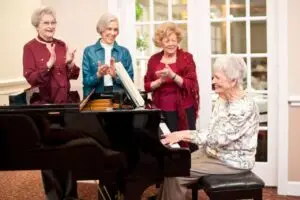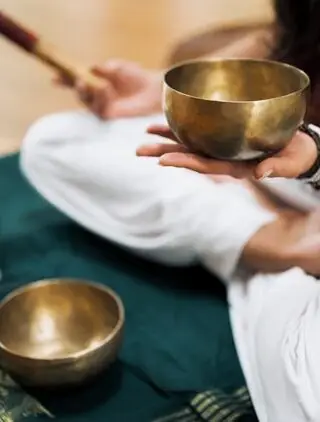Page Contents
Music therapy is a clinical, evidence-based practice where music is used to improve a person’s physical, emotional, cognitive, and social well-being. Guided by a trained music therapist, this form of therapy can involve listening to music, singing, playing instruments, or even composing songs.
Music therapy is tailored to the individual’s needs and goals, and it is particularly valuable in eldercare settings where traditional forms of communication may become challenging due to cognitive decline or frailty.
A brief history of music therapy
The roots of music therapy can be traced back thousands of years, with ancient cultures recognising music’s power to heal the mind and body. In Greek mythology, Apollo, the god of music, was also the god of healing. In ancient China, music was believed to restore the harmony of the body and spirit. However, modern music therapy began to take shape during and after World War II when musicians played for wounded soldiers in hospitals. The positive emotional and physical responses observed led to the formalisation of music therapy as a profession in the 1940s.
Today, music therapy has gained recognition worldwide and is used in various healthcare settings, including hospitals, mental health clinics, and nursing homes. Research continues to show that music therapy can improve outcomes for people with a wide range of health conditions, including dementia, Parkinson’s disease, and depression.
Music therapy and eldercare
In eldercare, music therapy has proven to be an effective, non-pharmacological method for improving the quality of life for seniors. As people age, they often face physical decline, cognitive impairment, social isolation, and emotional challenges. Music therapy can offer a holistic approach to addressing these issues. For residents in nursing homes, music can be a powerful medium to unlock memories, encourage movement, facilitate communication, and reduce feelings of loneliness.
For example, seniors with dementia may struggle with verbal communication, but they may still recall the lyrics of songs from their youth. Music therapy can create moments of clarity, joy, and connection, offering comfort to both the elderly and their caregivers.
Types of music therapy
There are two main types of music therapy approaches used with the elderly:
1. Receptive music therapy
In this approach, participants listen to music selected by the therapist. This can be combined with guided relaxation or imagery exercises. Listening to familiar songs can trigger memories and emotions, which is particularly helpful for individuals with dementia.
2. Active music therapy
In active music therapy, participants engage by singing, playing instruments, or composing music. This can help improve motor skills, coordination, and cognitive function. Group singing sessions, for example, encourage social interaction and provide a sense of community.

Benefits of music therapy for the elderly
Music therapy offers numerous benefits for the elderly, including:
- Cognitive stimulation
Helps improve memory, attention, and problem-solving skills, especially in individuals with dementia. - Emotional support
Reduces anxiety, depression, and agitation by providing a positive and uplifting experience. - Physical rehabilitation
Encourages movement, improves motor skills, and enhances coordination through rhythm and dance. - Social connection
Combats loneliness by fostering group interaction and shared experiences. - Pain management
Distracts from physical pain and promotes relaxation. - Improved sleep
Calming music before bedtime can help promote better sleep patterns.

Challenges and drawbacks
While music therapy offers significant benefits, there are some challenges and limitations to consider:
- Individual preferences
Not every elderly person enjoys the same type of music, which may impact the effectiveness of therapy. - Hearing impairments
Hearing loss can limit participation, requiring adaptive measures like amplifiers or vibrations. - Cognitive limitations
Advanced dementia or cognitive decline may make it difficult for some seniors to engage actively. - Therapist availability
Access to certified music therapists may be limited in certain regions or facilities. - Overstimulation
For some seniors, especially those with sensory processing issues, loud or complex music may cause distress.
Preparing a music therapy session for the elderly
When planning a music therapy session for elderly individuals, you may consider the following steps:
- Assessment
Understand the individual’s medical history, preferences, and therapeutic goals. - Personalisation
Select music that resonates with the person’s cultural background and life experiences. - Session structure
A typical session might include a warm-up (e.g., simple clapping or humming), a main activity (e.g., singing familiar songs or playing instruments), and a cool-down (e.g., gentle relaxation music). - Group dynamics
For group sessions, ensure inclusivity and encourage social interaction. - Feedback and adaptation
Observe responses and adjust the session accordingly to maximize comfort and engagement.
Did you know Traditional Chinese Medicine (TCM) also has music therapy?
In Traditional Chinese Medicine (TCM), music has long been associated with healing and maintaining balance within the body. The theory of the Five Elements connects specific musical tones to organs and emotions:
- Gong (宮) – Associated with the spleen; promotes calm and stability.
- Shang (商) – Linked to the lungs; helps relieve grief and enhance breathing.
- Jue (角) – Related to the liver; supports relaxation and reduces frustration.
- Zhi (徵) – Tied to the heart; uplifts joy and promotes circulation.
- Yu (羽) – Corresponds to the kidneys; fosters deep relaxation and reduces fear.
Integrating these principles into music therapy can create a more holistic approach for elderly individuals familiar with TCM, providing both physical and emotional balance.
Conclusion
Music therapy offers a safe, non-invasive, and enjoyable way to improve the well-being of elderly individuals. From enhancing cognitive function and emotional health to fostering social bonds and alleviating pain, the benefits of music therapy are extensive. Despite potential challenges, the adaptability and effectiveness of music therapy make it a valuable tool in eldercare.
As we strive to provide comprehensive and compassionate care for the elderly, incorporating music therapy into daily routines can lead to more joyful, connected, and fulfilling lives. Whether in nursing homes, home care settings, or through traditional healing practices, music truly has the power to heal and uplift the soul.
